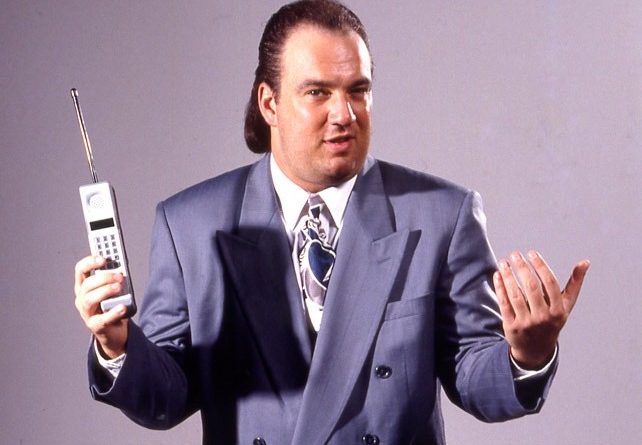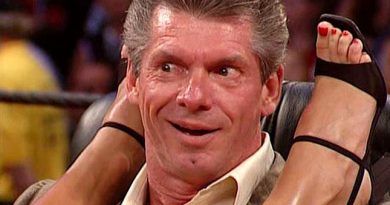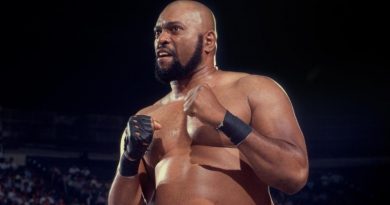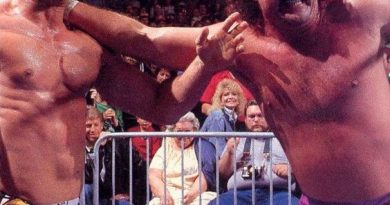Paul Heyman Sues WCW After Racist Remarks
The story of Paul Heyman’s departure from WCW isn’t well known, thanks to lawsuits and confidentiality clauses. Here’s everything we do know, including Bill Watts’ anti-Semitic remarks that in some ways led to Heyman taking over as ECW booker and changing wrestling history.
Date: November 10, 1992
Location: Georgia Mountains Center in Gainesville, GA
Source: Wrestling Flyer Interview Collection #2
Background – The Contract
In hindsight, the story surrounding Paul Heyman’s contract with WCW, and its eventual termination and lawsuit, is most interesting. Heyman had been working for Jim Crockett Promotions and the NWA since 1988, brought in as a young heel manager of the Original Midnight Express to feud with Jim Cornette’s Midnight Express. He also did work as a color commentator in 1989 and 1990, doing record ratings with Jim Ross on WCW Main Event that beat the Saturday TBS show on some weeks.
Heyman continued as a manager in 1991, and when Kip Frey was brought in to replace Jim Herd as the VP of Wrestling Operations at WCW, Heyman signed a very unique two-year contract on April 1, 1992 in which he’d be an employee instead of an independent contractor. It is believed no other talent in WCW had such a contract, and Heyman pushed hard for it because it meant he would now get his road expenses covered. Considering he was on the road 250 days out of the year, this was a big deal and would save him upwards of $40,000 a year. Heyman still made great money on his previous contract, which had bonuses built in to shut him up. He was willing to have a lower guaranteed salary as an employee because the road expenses were so significant.
The employee status was not something Kip Frey suggested or even agreed with. It had been promised to Heyman under the Jim Herd regime, and when it was time to sign a new contract, Heyman told Frey it had been promised to him. Frey still negotiated and played hardball, though ultimately agreed to grant him employee status.
Why would WCW want Heyman as an employee? Because they wanted the New York market very desperately, and Paul Heyman knew New York very well and had connections there. WCW had a show called “Pro Wrestling New York,” which aired only in the NY market and was hosted by Jim Ross and Paul Heyman. Heyman also had a hand in producing the show. It was very successful and WCW, to their credit, saw the value in Heyman being instrumental into making strides in the NY market. The new contract Paul Heyman signed was worth north of $200,000 per year, which is quite a bit more than many of the wrestlers were making (even wrestlers approaching that figure had to cover their own road expenses, which were significant).
New VP in Town: Bill Watts
Not long after Heyman signed his hefty new contract, Bill Watts was brought in to replace Kip Frey. Frey was always a temporary VP, as he admittedly had no knowledge or background in pro wrestling. His superiors, Bill Shaw and Bob Dhue, wanted someone in charge with a proven track record in pro wrestling. They brought in Bill Watts, who ran the very successful Mid-South Wrestling territory in the 1980s before it went belly up (as almost all territories did) as the WWF expanded. Watts sold his Mid-South Wrestling company to Jim Crockett in 1987, and Crockett himself was going to go belly up too until Ted Turner came to the rescue. TBS purchased Jim Crockett Promotions in late 1988, and in 1990 the NWA changed its name to WCW. WCW, now backed by Turner, competed with the WWF for all of the 1990s, losing at first, winning later on, and ultimately losing the war when the WWF purchased them in 2001.
Watts had a contract himself that paid him a percentage of money he saved WCW. He saw all these inflated contracts and balked, seeing that they weren’t drawing the money that warranted such high contracts. This made him unpopular as he threatened to job out some of the higher priced talent if they didn’t sign new, lower contracts. The most famous example was when Watts tried to re-negotiate with Brian Pillman, who told Watts that he’d happily be the highest paid jobber in the company, because he wasn’t signing a new contract.
Paul Heyman was another major target of Bill Watts, with his huge, guaranteed contract as an employee. Watts allegedly made an anti-Semitic remark towards Paul Heyman the first time they met, asking Heyman where his beanie was (a derogatory word for the Jewish yarmulke). From day one, Heyman resented Watts for this, and it only got worse.
Heyman claimed the company did everything possible to make him quit, as they really wanted his contract off the books. They’d make him stay in the studio for hours watching guys tape promos for television. But it didn’t work, as Heyman was happy to sit and learn by watching guys do promos, and he had made it clear he wasn’t signing a new contract or quitting no matter what they did.
The Incident
Several months into Watts’ reign, business tanked. There were bright spots, such as the Halloween Havoc 1992 buyrate, which was way up thanks to the excellent hype job of “Spin the Wheel, Make the Deal” and fresh main event of Sting against the debuting Jake Roberts. For the most part, however, ratings remained low, house show attendance remained low, the look of the TV shows was morbid, and morale in the locker room was in the toilet.
Heyman was still being targeted, and Bill Watts fined him for calling Madusa a “bitch” and “hooker” in a memorable promo at Halloween Havoc. While Watts had the right to do so, that promo was the only good thing about that PPV, which was among the worst in wrestling history. It had temporarily woken up the crowd, and was the only thing to get a good reaction all night (in the irony of all ironies, the show was held in Philadelphia, the future home of ECW).
Heyman was none too pleased with the circumstances surrounding the fine. He sent a letter to Watts, protesting the fine and explaining his side of the story. He told Watts that if he (Watts) didn’t agree with him, then he’d like to know the grievance procedure. He simply wanted a meeting with Watts in which he could explain to Heyman the grievance procedure.
On November 10, WCW did a TV taping in Gainesville, GA for Power Hour and WorldWide. WorldWide was a syndicated show and Power Hour was a very early morning show on Saturdays on TBS. Heyman was to do interviews regarding his upcoming match with Madusa at the Clash of the Champions XXI on November 17. Watts had been in a foul mood because his top heel (Jake Roberts) had just checked into rehab. Watts pulled Heyman aside backstage and talked to him about the letter.
“There’s no grievance procedure,” said Watts. “You won’t get a hearing. You won’t get a meeting. It’s my decision. I’m the head honcho. And that’s all there is to it.”
Heyman asked if Watts wanted to hear his side of the story. Watts said, “No, I don’t. I don’t want to hear anybody out. I’m the head honcho here and I do what I want to do.”
Heyman shot back with, “So, you can do anything you want. Does that include label me a scatterbrain and non-conformist?”
Heyman was referring to a statement Bill Watts had recently made to the Pro Wrestling Torch, in which Watts explained his decision to break up the tag team of Bobby Eaton and Arn Anderson. In the statement, Watts had called Heyman a scatterbrain and non-conformist.
Watts knew what Heyman was referring to, and said, “What the f*ck do you care what I say to them? They’re your buddies anyway.”
That was a very hypocritical statement from Watts, considering he was the first major promoter to openly support Dave Meltzer and even ordered his wrestlers in Mid-South to read the Wrestling Observer Newsletter in the mid 1980s. Watts had also done an interview with Wade Keller in 1991 for one of Keller’s annual books that he sold to readers of his Pro Wrestling Torch. In addition, Watts had asked Heyman to do an interview with Keller for the 1992 Summer Torch annual, which he did.
This hypocrisy was not lost on Heyman, who told Watts: “Hey, they’re your buddies more than mine. You talk to them a Hell of a lot more than I get the opportunity to. You’re quoted every week.”
Watts actually said, “I never gave them a f*ckin’ interview.”
Amazing. It had not even been a year since Watts had given Keller that major interview, the same interview which eventually led to Watts being fired for his racial remarks about African Americans. While insiders knew of that interview already, it had not yet been brought to the attention of those in TBS (specifically Hank Aaron). That would come just a couple months later. For now, Heyman actually reached into his bag and dug out the Torch Annual that had the Watts interview.
Boom.
Heyman said, “Why don’t you explain this to me?” He then read Watts the racial remarks that would later lead to Watts’ firing, which took place at the very end of the interview.
Watts panicked. “Where did you get that, where did you… You have no right to have that.”
“Why don’t I have a right to have it?” asked Heyman. “You said it, he printed it, and I bought it. I paid $9 for it.”
At that point Watts said, “Ahh, you f*cker, why don’t you go back to New York to your Jew f*ckin’ lawyers because you all belong together.” He then turned around and walked off.
Heyman claimed this was not the first time he had made such anti-Semitic remarks, but that this time it was done in front of witnesses.
Common sense logic says that if you’re trying to terminate a guy’s contract, and he comes from a family of attorneys from New York, you don’t make racial remarks. Bill Watts lacked common sense logic. He knew pro wrestling booking logic, but not management logic. He was already toast with the comments he made to the Torch that eventually got him fired. These comments only made things worse for him.
If you recall, Watts had a big meeting with the wrestlers around this time and called Paul Heyman and Madusa, respectively, a “Jew and a c*nt.” Heyman has told two versions of that story: 1) that it was said after Heyman and Madusa stole the show at Halloween Havoc, and 2) that it was said after Heyman and Madusa had one of the highest rated segments on the Clash of the Champions XXI show. In either case, there were also witnesses.
WCW Fires Paul Heyman
Not long after Watts’ remarks, WCW fired Paul Heyman. As noted, they badly wanted his contract terminated and were looking for any reason to do so. Heyman was under investigation, and the investigators were instructed to find anything that would allow the company to legally terminate him. As part of the investigation, the investigators discovered Heyman had “falsified” expense reports in Atlanta.
Of course, the story was bull. There was one instance in which Heyman did not get a receipt for a hotel stay, in which he forgot to do so because it was common practice for the boys to just slap down $40 for a night at the Ramada Atlanta Airport South (WCW reimbursed him up to $38 for hotels as part of his contract). When WCW questioned it at the time, Heyman asked that since he didn’t have his receipt, if he could get a letter from the hotel proving he was there on that night. WCW said that would be fine. So Heyman got the letter and sent it over. Suddenly WCW said the letter wouldn’t be acceptable. Heyman could’ve pressed the issue further, but decided it wasn’t worth it and just ate the expense (which totaled $1,162.50 when everything was included).
Because of that missing receipt, WCW launched the aforementioned investigation into Heyman’s expense reports. They found several instances of missing receipts and falsified reports. However, there’s a simple explanation for that: Heyman never checked into hotels under his real name or even his wrestling name (Paul E. Dangerously at the time). Most wrestlers and on-air talent used aliases and pseudonyms at hotels to protect their privacy from fans. Everyone knew this except the investigators, as they were used to investigating executives who traveled once a month and had no reason to use fake names.
The thing is, the hotels told the investigators this, and they still didn’t care. They were under strict orders to nail Heyman for anything, no matter how small or innocent.
When Heyman’s weekly check didn’t come in the mail, he called the WCW comptroller. He told Heyman he was under orders to withhold his check. Heyman tried reaching others in WCW, but they were coming back from the Clash of the Champions XXII in Milwaukee (January 1993) and this was before cell phones. He did reach Jim Ross, who was technically Heyman’s immediate supervisor. Ross called the same comptroller and was told to stay out of it, and to tell Heyman that if he had any problems, to contact the Turner attorneys.
Oops. Never tell a lawyer’s son to ‘lawyer up.’
The Lawsuit
Naturally, Heyman sued. His father and other personal attorneys told Heyman that he was wrongfully terminated. To sweeten the pot, he also sued WCW for ethnic discrimination. He smartly sued WCW, as opposed to Bill Watts, because he knew WCW had a lot of money to collect from.
In mid February of 1993, they served WCW with papers. It was impeccable timing for Heyman, as Watts had been fired just a few days prior. Why was Watts fired? As noted, he had given an interview to Wade Keller in the 1991 Torch Annual that contained heavily racial remarks against African Americans. That’s a separate story we’ll report on another day.
WCW was now faced with a public relations nightmare if word got out they had a racist running their wrestling company. Fortunately for TBS, this happened at a time nobody cared about WCW, and the press largely ignored it. Still, it did get media attention locally in Atlanta, and Hank Aaron was furious (he’s a baseball legend who worked for TBS). As a trivia note, it was Torch columnist Mark Madden who faxed the interview to Hank Aaron, which led to the firing of Watts.
Heyman’s lawsuit alleging ethnic discrimination came at the perfect time, because Watts had just been fired for racial remarks. Not wanting to publicize the controversy any further, WCW settled with Paul Heyman out of court. There are confidentiality clauses involved, so nobody knows how much Heyman received.
What is known is that was “a lot” of money, and largely afforded Heyman the ability to not worry about drawing a paycheck during what would become the most important period of his life later that year. At first Heyman was going to get a morning radio gig in New York City, head to head with Howard Stern. It’s a battle he would’ve likely lost, as Stern was red hot at the time, at the top of his game creatively and in terms of listenership. He was unstoppable; a far cry from the relative obscurity Stern lives in today on satellite radio.
Heyman was going to then book for Jim Crockett’s WWN (World Wrestling Network), now that Crockett’s non-compete with TBS had ended. He did book a major TV taping for them in 1994, although by that time he had also been named booker for ECW (then known as Eastern Championship Wrestling) after owner Tod Gordon chose him to replace Eddie Gilbert in the role. The WWN never panned out, and Heyman made ECW his baby and went onto revolutionize the wrestling industry with his vision.
Had Watts never made those racial remarks, and had WCW never fired Heyman, he would’ve remained under contract until April 1, 1994. He likely may have never linked up with ECW, and if he hadn’t, pro wrestling as we know it today would not exist in the manner it does.




